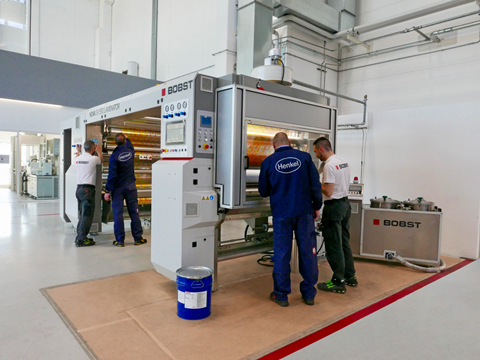
BOBST and Henkel have combined their skillsets in a bid to pursue optimized machine operations, environmentally conscious adhesives, paper-based flexible packaging barriers, and more.
As climate change becomes an increasingly prominent area of focus for the packaging industry, BOBST observes an increase in partnerships and corporate collaborations in pursuit of systemic change. Its own work with Henkel brings together the companies’ respective expertise – BOBST’s in processing, printing, and converting equipment, and Henkel’s in adhesives, sealants, and functional coatings – in hopes of unlocking sustainability-minded packaging solutions.
BOBST’s four key pillars are sustainability, digitalization, automation, and connectivity. Its sustainability strategy is split into three defined streams: operations, which includes energy, water, and waste; equipment, such as machine energy consumption and extending machine life; and packaging use and end-of-life, e.g. environmentally improved packaging.
Meanwhile, Henkel’s 2030+ Sustainability Ambition framework sets out three long-term sustainability dimensions: Regenerative Planet, Thriving Communities, and Trusted Partner. Its overall aspiration is described as ‘Pioneers at heart for the good of generations’.
“We may be a big organization, but we are an organization made up of people who really care about this topic,” says Nanni Bertorelli, product line director for Coating & Laminating at BOBST. “As an industry leader, we know we have a responsibility to innovate in this area and help to find solutions that benefit society. Working with other industry leaders with shared values and goals such as Henkel is a guaranteed way to accelerate innovation.”
“We can contribute to solving global challenges through our areas of specialist expertise,” adds Mauro Bonfiglio, business development director for Packaging at Henkel Adhesive Technologies. “We can enable sustainability through material science and scientific know-how in bonding, sealing and coating.
“We are excited to work with BOBST to combine our packaging knowledge, material and application expertise to develop sustainable solutions which enable circularity and decrease carbon footprint while not compromising from efficiency and performance.”
In 2022, Henkel and cyclos-HTP Institute entered a strategic partnership in pursuit of a comprehensive, aligned service combining each company’s knowledge. The cyclos-HTP Institute standard assessment is thought to adhere to the drafted Packaging and Packaging Waste Regulation, in which all packaging material types must have a recyclability assignment in mass-%, and is expected to become an ‘essential benchmark’ in evaluating the recyclability of packaging.
BOBST, together with other industry partners, has utilized this assessment method to certify recyclability levels of its oneBARRIER, a portfolio of recyclable mono-material substrates designed to replace non-recyclable, metallized polyester film. In particular, oneBARRIER PrimeCycle – a solution made of EVOH and topcoat-free, transparent AlOx-based or opaque AluBond-based full-PE mono-substrates – is certified with a recyclability level of 98%.
Now Henkel and BOBST have set their sights on developing other sustainability-minded solutions, including barrier solutions for flexible packaging utilizing paper and other substrates. They also seek to provide joint training and improve the sustainability of both adhesives and machinery.
“Our early joint strategic approach has been very productive, and we can already see several areas of collaboration that are rich with potential,” Bertorelli adds. “For now, it is a case of ‘watch this space’. But soon, I hope we can reveal our combined plans for a more sustainable tomorrow.”
If you liked this story, you might also enjoy:
How are the top brands progressing on packaging sustainability?
The ultimate guide to global plastic sustainability regulation














No comments yet